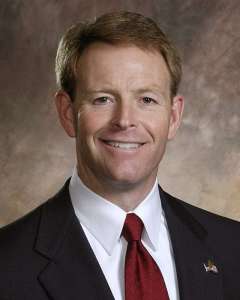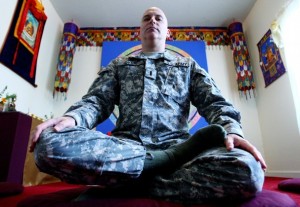How slippery is that slope?
Freshman writers frequently—and generally unintentionally—use logical fallacies to bolster their arguments. Don’t like Obama’s healthcare plan? Whip out the ad hominem rhetoric, call the president a socialist thug, and ignore the legislation’s specifics. Want to avoid reading your opponent’s complicated endorsement of the free market? Build a straw argument and burn it to the ground without breaking a sweat. Most of the time, such fallacies flow from either lazy thinking or ignorance, and two tasks of a composition teacher involve encouraging nuanced argument and explaining why certain rhetorical maneuvers represent weak logic. Generally, the process approach to writing can aid the former, while class discussion of model texts can assist with the latter. By the end of Composition II, most students can usually craft an argument without leaning on fallacies.
Reading Tony Perkins’ “My Take: Ending ‘Don’t Ask, Don’t Tell’ Would Undermine Religious Liberty” on CNN.com, however, reminded me that writers often employ fallacies not out of laziness or ignorance but because they can often effectively manipulate an audience. Perkins’ premise, conveniently stated in his title, holds that allowing openly gay and lesbian military personnel to serve would effectively alienate individuals subscribing to the “great monotheistic religions” and thus “the numbers lost will dwarf the numbers gained by opening the ranks to practicing homosexuals.”
Perkins fears that
sensitivity training intended to indoctrinate them into the myths of the homosexual movement: that people are born “gay” and cannot change and that homosexual conduct does no harm to the individual or to society.
He continues that clergy, in particular, may face recrimination for discussing scripture that condemns (or ostensibly condemns) homosexuality. As a result, the military would soon have a glut of “Unitarian ministers and homosexual Episcopal priests” but a shortage of Catholics and Southern Baptists. Ultimately, Perkins declares, repealing the 1993 policy “would mean placing sexual libertinism — a destructive left-wing social dogma found nowhere in the Constitution – above religious liberty, our nation’s first freedom.
Where to start?
As numerous commentators point out, gays and lesbians have served in the American military since its inception. To argue, as Perkins does, that repealing “Don’t Ask, Don’t Tell” would allow “practicing homosexuals” to join the armed services begs the question and ignores the clear evidence that gays and lesbians have served and continue to serve.
Perkins’ primary fallacy, however, is the slippery slope, an error in reasoning that suggests because “A” happens, “B” (usually extremely negative) will necessarily follow. Perkins asserts that allowing gays and lesbians to serve openly will spark an exodus and “usher out the back door anyone who disapproves of homosexual conduct.” Setting aside the idea that a nation based on individual freedoms should not bar otherwise competent (mentally unstable people and convicted felons here being classified as incompetent in terms of military service)individuals from serving their country, Perkins fails to explain why anti-gay citizens would flee while anti-Muslim, anti-minority, anti-women, anti-liberal, anti-conservative, anti-atheist, anti-choice, anti-Wiccan (etc.) people continue to work side-by-side with those who hold vastly different religious, political, and social views. By his own admission, Perkins supplies evidence—speculation that the military would conduct pro-gay “indoctrination”—for the impending flight of anti-gay/lesbian personnel not from the proposed legislation itself but from a different bill altogether. Perkins’ notion that the proposed repeal would set off an uncontrollable and undesirable chain of events contains dramatic flair but little in the way of logic.
Further, Perkins’ alarmist suggestion that military chaplains would suddenly find themselves hamstrung by politically correct policies designed to thwart first amendment rights equally rests on a slippery slope argument. According to goarmy.com,
Army Chaplains are expected to observe the distinctive doctrines of their faith while also honoring the right of others to observe their own faith. The Army is a pluralistic environment. Rabbis, Ministers, Imams and Priests serve our Soldiers with conviction and commitment. While serving their own faith groups in the Army, chaplains also ensure and provide the means for others to observe their own faith in accordance with US law and regulations.
Clearly, chaplains already must juggle their own theological views with those of others and provide interfaith services. To suggest that a repeal of Don’t Ask, Don’t Tell would lead anti-gay chaplains to leave the service runs contrary to current practice, in which clergy provide spiritual guidance to those whose views (on abortion, say) may be personally repellant to them. It’s questionable that a fundamentalist chaplain who already counsels soldiers who practice Hinduism and Shintoism would balk at spiritually aiding a gay Lutheran.
Finally, Perkins’ suggestion that “sexual libertinism” (which he colorfully and anachronistically labels a “destructive left-wing social dogma found nowhere in the Constitution”) would displace freedom of religion flies in the face of centuries of constitutional law. While the Supreme Court has indeed curtailed public institutions from endorsing particular religions (teacher-led prayer, for instance), it consistently upholds the individual’s right to practice religious beliefs within those same institutions (religious clubs in state universities, for instance). Perkins’ notion that a single policy could scuttle such precedents demonstrates that he grounds his logic not in evidence but rather on the slipperiest of slopes.
Perkins, no doubt, passed his Composition II course, but, in striking fashion, his article fails to implement the lessons taught therein.






Did you leave this as a very long public comment? This is the kind of thoughtful, logical comment I could really get behind.
Bee, when I finished reading Perkins’ essay, I was fuming. Blogging about it without resorting to ad hominem (very difficult, trust me) was cathartic!